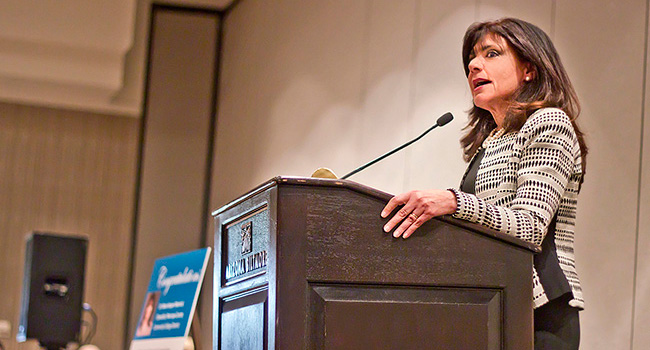During the last legislative session, the Maricopa Community College District was snubbed from state aid, and this year, its longtime Chancellor Rufus Glasper stepped down to pursue an opportunity as a CEO for an education nonprofit.
Sitting in for someone who’s leaving behind a 13-year legacy and facing upcoming financial troubles doesn’t seem to have Dr. Maria Harper-Marinick worried.
In May, she was announced as the district’s first Latina chancellor and she has her eyes set on successfully moving the system forward through these trying times.
“Whatever we do, we need to make sure that access (to Maricopa Community College) is not denied to anybody because we do not have the resources,” Harper-Marinick said.
Az Business sat down with Harper-Marinick to talk about what she has in store for the district’s future and more.
Az Business: How does it feel to be the first Latina chancellor of the district?
Maria Harper-Marinick: Part of me is obviously proud, but the second thought is, “Really?” It’s 2016, you know. What took so long? But I’m looking forward to serving the district with excellence, because I know for a lot of young women, I can be a role model. And I am a role model. So for them, I need to serve as well as I can. I need to take the system to the next level, and make sure all of the students are as proud to be a part of the system as I am.
AB: What are some of your goals with the district?
MHM: We are facing financial challenges, so we need to make sure we have a sustainable financial model for the system. We are reliant on enrollment because we don’t have any state aid anymore. So we need to make sure we find ways to be a little more entrepreneurial than we have been—that is one of the challenges. Also, we need to sell the system, to make sure that more people know about what we do, especially the connection with the business community. I want them to have us top of mind. I don’t want people thinking, ‘Oh there’s Maria. We forgot.’ I want them to know if we need to have innovation in place, if we need to have a new program in place, then Maricopa Community Colleges is the first place to go to get that solution.
AB: Education funding has been a big challenge in Arizona. How do you hope to overcome the funding woes?
MHM: Some of it will be working with legislators in a different way. Maybe they need to understand better what we do and for whom we do it. But that’s not the only thing we need to do. We need to find other ways to either serve the business community in a partnership that would generate revenue for us, or be more entrepreneurial. We have limitations on what we can do around that space, but I think we need to find new and innovative ways to provide a service that generates resources so that we can serve all of the students that come to the system. Whatever we do, we have to make sure that access is not denied to anyone because we do not have the resources.




